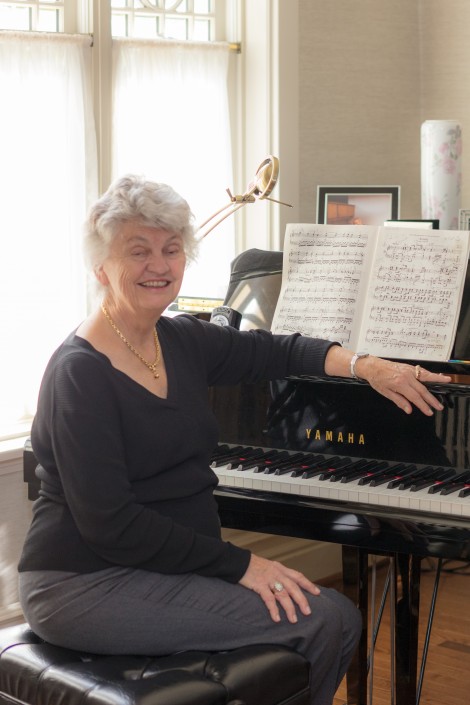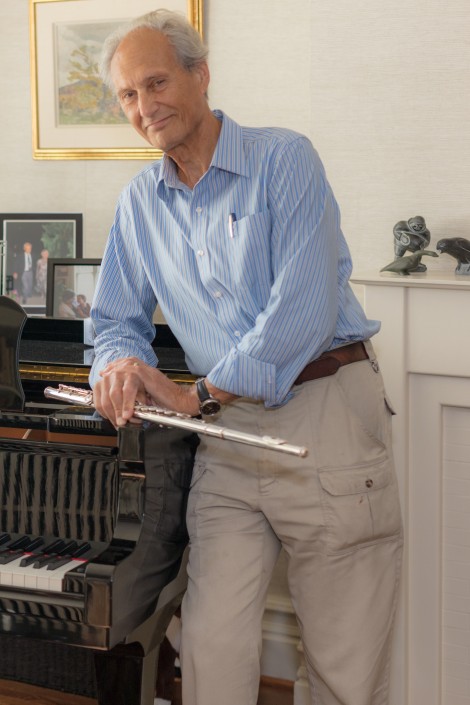[dropcap]T[/dropcap]ogether, they have earned two MDs, one PhD, one MSc, two professorships, and over 6,000 citations. They have travelled the world, recorded music, and pioneered the Augusta Stowe-Gullen stream of Vic One. They have served as principal, vice-principal, vice-dean, and chair. They have rubbed shoulders with the likes of Dr. Ursula Franklin. Fundamentally, they have altered international conversation on breast cancer screening.
But anyone that has met Drs. Andrew and Cornelia Baines won’t immediately talk of their titles or accolades. Instead, they will speak of their humble brilliance, genuine care, and ability to inspire. If the word ‘successful’ can ever be appropriately used, it is in reference to these two giants in our midst. And through more than 60 years of continuing achievement, they have always had one constant: each other. This is their story.
Since the age of two, C. Baines was convinced she wanted to become a doctor. Today, that idea is commonplace: a standard line in any application to medical school. But in the 1950s, the idea of a woman aspiring toward a career in medicine was far less common.
In her own words, “It was very obvious to anybody at that time that a woman who wanted to go into medicine could not be normal. So, the conclusion was, that my mother had a very abnormal daughter.” Even some of her peers at medical school were shockingly sexist. C. Baines recalled: “[They said] it was a disgrace that I was in medicine because all I was going to do is get married and I’d never use my education and I should have never been allowed to come in.”
But none of these comments ever dissuaded C. Baines from pursuing her aims. She had two very supportive parents, crediting her mother for teaching her “to have a thick skin.”
“I endured during public school… a lot, and I mean a lot, of bullying… People that are different are always bullied, and that’s the way of the world. What it meant was that I ended up gaining a very strong sense of ‘You choose what you want to do, and if other people don’t like it, too bad for them,’” explained C. Baines.
A. Baines was more undecided on his life path as a teenager. He recalled wanting to be an artist, a civil engineer, and a physicist before finally settling on medicine.
When asked how students today who are similarly undecided can find their passions, he responded: “I think the most important thing is to do what seems right for you, not what you think is being imposed on you as ‘right.’ I think the thing that is difficult for many young people, particularly when they’re unsure, is choosing your acquaintances, and ultimately your friends, as the ones who challenge you, the ones who make you think out of the box, [the ones who] make you strive to do better. I think you do most of your learning… from your colleagues, the students.”
A. Baines went on to complete his PhD, and credited the late Franklin as someone “who’s influenced [both him and C. Baines]. She really did act as a mentor for me when I was doing my PhD. She would put problems before me that were big issues.” In fewer words: “She made me think”.
A. Baines was convinced he would never go into research after “[sitting] in a little room, making sections of monkey hearts to look for the innervation.” He recalled thinking, “This is so awful!” Ultimately, however, he found that he loved studying fluid and electrolyte balance, which led him to pursue kidney research.
“I was very interested in the kidney for two reasons. One, I really liked the look of it. I loved looking at it under a microscope — really cool structure! And the other one was that [C. Baines] had kidney disease,” he explained.
With this impetus and further support from a professor, A. Baines went on to conduct kidney research and hold various positions such as Principal of New College, Chair of Clinical Biochemistry, and Vice-Dean, Education for the Faculty of Medicine at U of T.
Unlike the Baines, many students aren’t accepted into medical school on their first, second, or even third attempts. While they made it clear that the decision to continue applying is specific and variable to each individual, they did have some general advice on medical school and life as a whole.
A. Baines pointed out, “It depends on the motivation for applying. [Being] a doctor is like being a priest; something that you really need to feel like you have an affinity for, a desire to do.”
C. Baines recommended a “diversity of experience; don’t only study that which you think will amplify your chosen career. Be aware of the rest of the world and participate.”
Despite their demanding workloads, the Baines have always managed to find time to spend with each other. While acknowledging that “compatibility of lifestyle is important,” A. Baines contended that “compatibility of temperament and interest is the most important” to maintaining a relationship.
C. Baines added that they choose to spend their free time doing activities with each other. “That helps counter the demands of the work because you know that when work is over and tasks are over, we’re going to be together,” she explained
Neither of the Baines show signs of slowing down as they age.
Decades after her unpleasant experience with sexism in medical school, C. Baines had to take a stand against baseless accusations again. Her study showed that breast screening may not be effective in preventing death due to cancer, a highly controversial report that she defended.
“I have been… accused of fraud, accused of murder — which is clearly not true. I think my mother, by bringing me up with standards different to those in the community, made me think, ‘I do what I decide to do and disregard, as much as possible, negative feedback,’” she commented.
Meanwhile, A. Baines started the highly successful Augusta Stowe-Gullen stream of Vic One, where he matches first-year students with scientists in the field to design and compose grant proposals. At the end of the year, the Baines invite the ‘Stoweners’ to their home to celebrate a year of learning and hard work.
When asked where they get their continuing drive, the Baines responded instantly, with heartfelt conviction. C. Baines began, “We’re doing what we like doing, we’re still growing.” A. Baines added, “I am the one who benefits, I learn so much from the Stoweners.” Then C. Baines finished, “It’s been a wonderful experience for us both.”
Today, the Baines continue to enjoy lives filled with activity and inspiration: they live life to the fullest and teach by example.
As A. Baines put it: “Be greedy for life. Be interested. Be curious. Be adventurous.”




